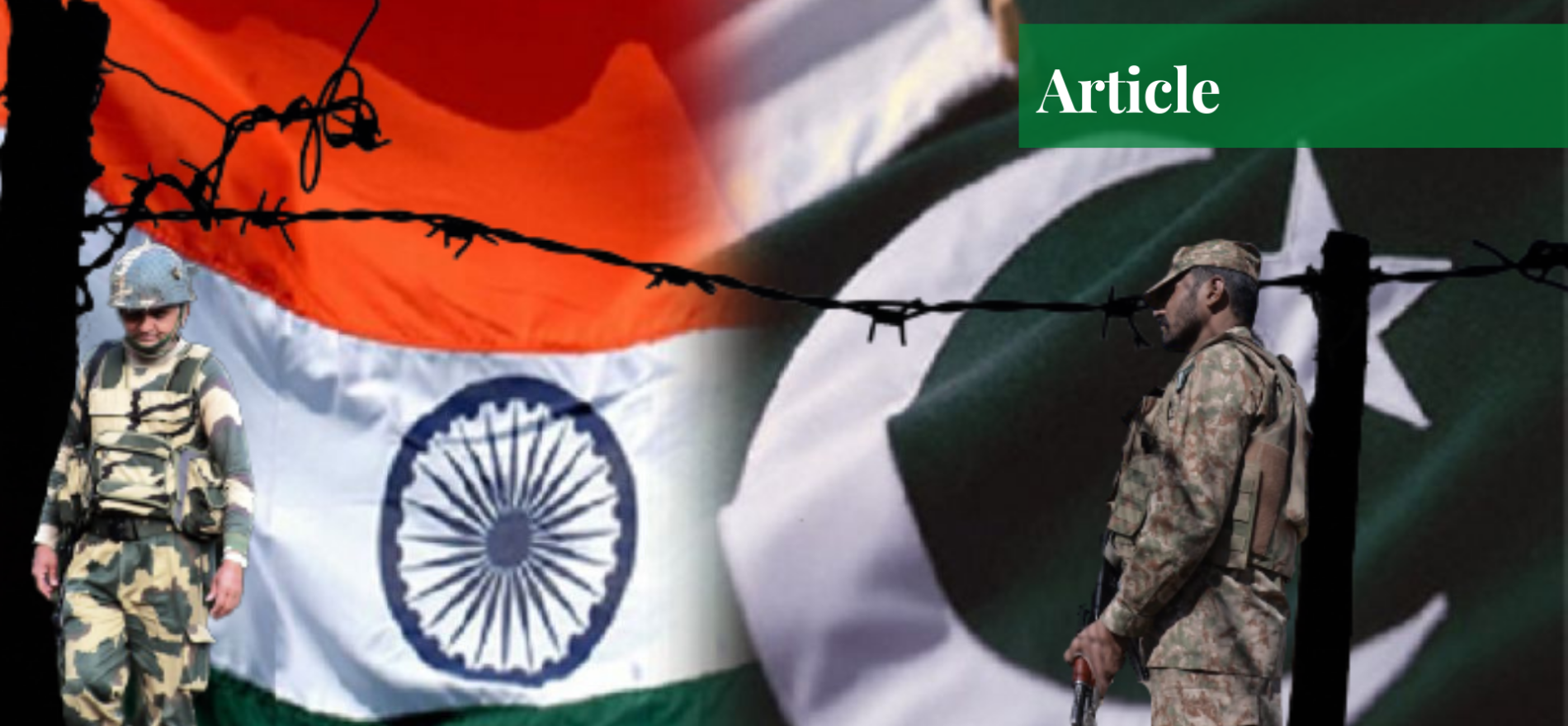Mr Muhammad Hamza Tanvir is an independent journalist and a political analyst, focusing primarily on regional and global strategic and political issues. He has authored numerous articles for different national and international publications.
An Imbalance of Power
The British set a foundation for a deep-seated rivalry between their South Asian colonies: India and Pakistan. This inherited adversary has resulted in four wars between the two nations. Both nations, since then, are entangled in a security dilemma that has ensued a costly and perilous arms race in the region.
The response of the global superpowers towards both nuclear states has been polarized; international organizations surveilling nuclear weapons hold a biased approach to Pakistan’s nuclear technology. Dr. Abdul Qadeer Khan’s conspiracy has ruptured the image of the country; however, that was the first and the last case of a nuclear proliferation involving Pakistan.
Despite being highly impinged by terrorism, the country has succeeded in ensuring the safety of nuclear technology. On the other hand, India has rather failed in deciphering the famous maxim, “With great power comes great responsibility” as multiple cases of uranium theft in India have been reported.
This exhibits India’s poor nuclear security which posits a threat to regional stability and global peace. The recent two cases of nuclear theft in India demonstrate the incapability of the Indian forces and security agencies to guard their nuclear capabilities. The international organizations which have raised concerns about the security of Pakistan’s nuclear capabilities have not taken any action against the spread and sale of uranium in the Indian black markets.
Pakistan’s Foreign Office and many international think tanks have raised concerns regarding the security of Indian nuclear technology. However, prominent international organizations on the disarmament and security of nuclear technology remain quiet. Furthermore, the US has extended support and efforts to India to help it gain Nuclear Suppliers Group (NSG) membership despite the serious threats to its nuclear technology.
This depicts the biased approach of international agencies towards the two neighboring nuclear powers. While India has continued to malign Pakistan on international forums regarding its nuclear capabilities, the recent events portray the situation to rather be at all odds for India.
India and Pakistan‘s NSG Membership
Both states have applied for the membership of the Nuclear Suppliers Group (NSG) since 2016. The memberships have not been accepted due to the admission criteria and lack of NPT status possessed by both states. India’s desire to gain membership of NSG is a step in pursual of its agenda of becoming a superpower.
The United States and many of its member states are providing support to India in acquiring the NSG membership. If India succeeds in becoming an NSG member, it will be the second country after Israel to acquire the membership without signing the NPT; a multilateral treaty aimed at limiting the spread of nuclear weapons
In the 2016 NSG meeting, the United States and India pushed the NSG to accept India’s membership application. All member states but China supported the Indian application which abstained NSG from accepting India’s bid. In response to India’s bid, Pakistan also solicited the membership of NSG.
Furthermore, India holds access to high-end nuclear technologies as a corollary of its deal with the US and the 2008 waiver by the NSG. India has also signed civil nuclear deals with Japan, UK, France, and many other countries. Hence, India has acquired most of the benefits the NSG membership holds. On the other hand, despite being a state with more secure nuclear assets, Pakistan has not been granted any such status by the NSG. The demands of NSG and western states remain strict for Pakistan.
While addressing a conference arranged by the Strategic Vision Institute, former diplomat Zamir Akram stated that Pakistan was continuously questioned regarding its stability and demanded to ensure itself as a responsible state. He added that to acquire the certificate for responsibility, it would have to compromise its nuclear program. He further singled out the discriminatory behavior of the western countries at the conference.
Speaking at a webinar, Kamran Akhtar, the Director-General of the Arms Control and Disarmament Division at the Foreign Ministry stated that the NSG epitomizes the politics of non-proliferation at the global level. He iterated that the NSG weighs India and Pakistan on different standards, holding a biased approach towards Pakistan.
Furthermore, he noted the importance of geopolitics in driving the decision-making and functioning of NSG. This depicts the domination of the US and other western countries in the global capitalist institutions; these are, in turn, used in favor of their allies and for coercing other states. This could result in India obtaining the NSG membership in the future, while Pakistan could be barred due to its association with China.
Pakistan’s Nuclear Security
Global powers have demonstrated a bias against Pakistan’s nuclear technology; it has been increasingly claimed that the country’s nuclear facilities are in jeopardy due to rising state terrorism. Pakistan has proved the notion wrong to date. However, the Dr. Abdul Qadir Khan case greatly tarnished the image of the country.
The country started its journey of gaining nuclear capabilities in the year 1976 to balance the power disparity in the region with its arch-rival India. Dr. Abdul Qadeer Khan emerged as the hero of the nation for making the nuclear bomb for Pakistan. In January 2004, the United States agencies intercepted a German ship named BBC China carrying parts for the Libyan nuclear weapons production program.
Libyan authorities, to denounce its nuclear ambitions, named Khan Research Laboratories as a supplier of nuclear technology. This landed Pakistan in troubled waters as the country bore behemoth external pressure. General Musharraf, the then head of State, denied any such involvement or awareness regarding any such activity undertaken by Dr. Khan.
In the aftermath, Dr. Khan was arrested by the state and an agreement was made between the two. Dr. Abdul Qadeer Khan publicly apologized to the nation and accepted his mistake on 4th Feb 2004 and General Musharaf pardoned him because of his previous services for the country. This event is a single instance of a security breach in the country.
This issue caused irreparable damage to the country’s image; India has since then maligned Pakistan for being an insecure state for holding nuclear capabilities. However, the international reports on Pakistan’s nuclear program safety are averse to India’s portrayal. As per the National Threat Initiative’s Nuclear Security Index report, Pakistan ranks 19th with 47 points.
Similarly, in the past, the former US President, Barrack Obama, stated that the nuclear arsenals of Pakistan were in safe hands. Despite no reported case of nuclear theft, the international media and many concerned organizations continue to clamor about the security of the country’s nuclear assets.
This is due to the myth of the “Islamic Bomb”. The West and its allies, with widespread Islamophobia, consider Pakistan’s nuclear arsenals as the arsenals of the Muslim world; however, this is false as if it were the case then Pakistan would have used it in the favor of its Palestinian brethren or any other Muslim country.
A Tale of Nuclear Thefts in India
The recent incident of the theft of uranium and its sale in the black market is neither the first of its kind and may not be the last one; numerous cases of the act have been reported in India. The first such incident occurred in November 1994, when a four-member clique was arrested from the Domiasiat region by Meghalaya Police, retrieving 2.5kg of uranium which was to be smuggled.
In June 1998, Indian police arrested an opposition politician in West Bengal, claiming that he was carrying more than 100kg of uranium. Another such incident occurred in the same year when the India Central Bureau of Investigation (CBI) exposed a major gang involved in the theft of uranium and seized 8kg of nuclear material. In August 2001, the Indian police arrested two men in the state of West Bengal carrying 200 grams of semi-processed uranium.
Followingly, in 2003, Indian security agencies arrested members of a terrorist group in a village on the Bangladesh border with 225 grams of milled uranium. A container possessing the radioactive material was stolen from a government-run research facility in the eastern region of India in December 2006.
Another such case surfaced in 2008 when a gang was caught attempting to smuggle low-grade uranium from one of the country’s state-owned mines. The tale does not end here, as in 2013, the Indian government officials stated that the guerilla fighter in northeast India illegally obtained uranium ore from a government-run milling complex and used it to make high explosive bombs.
Another incident occurred in December 2016, with the Indian security agencies seizing around 9kg of radioactive uranium from two men in Thane. In 2018, an incident occurred in Kolkata. Recently, two such cases have occurred in less than a month – one in May and the other one in June this year.
Pakistan’s Foreign Office has called for an investigation into the theft of uranium in India, but no international organization or state is willing to hold India accountable because of its economic and strategic importance to the United States.
Will India Obtain NSG Membership?
The pattern of uranium theft in India is appalling. The recent incidents of uranium theft in India have raised concerns regarding its nuclear technology; it could be misused by the Rashtriya Swayamsevak Sangh (RSS) against the Muslims in Kashmir and other Muslim dominant regions. The uranium from the Indian black market could reach the hand of terrorist organizations like Al-Qaeda, TTP, ISIS, and even the terrorists in Balochistan which are backed by RAW.
The membership of India in NSG could alter the power balance in South Asia, further jeopardizing the region’s security and global peace. Henceforth, international organizations must abstain from involvement in power politics and treat both states on neutral grounds to avoid any sort of regional or global crisis; it must also put pressure upon India to secure its nuclear arsenals.
If you want to submit your articles and/or research papers, please check the Submissions page.
The views and opinions expressed in this article/paper are the author’s own and do not necessarily reflect the editorial position of Paradigm Shift.



















